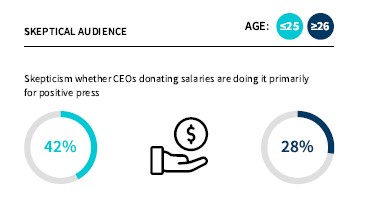Born To Be Influencers
Is business prepared for the new generation of expectation & scrutiny?
Against a backdrop of economic and political uncertainty, a new generation of consumers is here and rapidly evolving the way we do business in a time of unprecedented change. Known colloquially as the “iGen”, “Centennials”, or more commonly, “Generation Z”, this new audience presents both opportunity and caution for business. As they begin to enter the workforce, become financially independent and continue to strengthen their online voice, how can businesses stay relevant to this complex, skeptical, and values-driven generation?
The New Enigma for Business
FTI’s “Shifting Expectations”[1] research reveals Gen Z to be a generation that shares a realistic, yet skeptical approach to how they view business. Gen Z tends to be more reticent of advertisements and corporate initiatives, and increasingly desires complete transparency from companies. They also are mindful of the power large companies exhibit, with more than one-third (38%) of Gen Z saying they are increasingly concerned that these businesses are capitalizing on the misfortunes of their smaller competitors, compared to 33% of older generations.
Beyond general skepticism, the future actions of Gen Z will continue to challenge businesses in a post-pandemic world. Only one-in-five (19%) of Gen Z plan to return to their pre-pandemic shopping behaviors, compared to 31% of older generations. Businesses will continue to face the reality of a customer base who is and always has been comfortable online, and one which will continue to solidify this purchasing stance, with 40% of Gen Z expecting to shop and buy online post-pandemic, compared to 29% of older generations.

Gen Z is defined by an unwavering search for truth and self-expression. They expect businesses to deliver value to their customers, employees and suppliers on an ethical level. They are also three times more likely to believe the purpose of a business is to “serve communities and society” than other generations according to a joint study from BBMG and GlobeScan[1]. However, it’s not enough for businesses to act in tokenism—such actions won’t be seen as authentic by this generation. In fact, 42% of Gen Z believe CEOs who have volunteered to donate their salaries during the pandemic are simply trying to get positive headlines, far more than the 28% of older generations.

In addition to being skeptical of the motivations behind company executives, Gen Z is also less forgiving of corporate silence. A study conducted by Morning Consult reported that 69% of Generation Z’s buying choices will be greatly affected by how a CEO addresses a topic similar to the Black Lives Matter movement.[3]
Together these trends indicate that Gen Z will not take purpose-driven corporate initiatives at face value. They expect an empathetic, human voice and an authentic stand on relevant and current social issues, backing up corporate dialogue with tangible change, and they are willing to use their purchase power to drive home the point.

The Power of Social Influence
The importance of humanizing organizations is even more prevalent considering the inclination and expectation of Gen Z to communicate with brands online. As a generation that has never known a life without the Internet, these digital and mobile natives look to online as the main way to interact with brands and companies. They have quick access to reams of information that make them simultaneously well-informed and callously critical.
As of May 2020, 40% of Gen Z had either posted or shared a positive story of a business or its leader going above and beyond during the COVID-19 pandemic, 7 percentage points more than other generations. However, Gen Z are also almost three times more likely (33%) than other generations (12%) to have posted about negative actions of a business. As a company, if you get it right, Gen Z will endorse you, but if you get it wrong, they will hold you accountable online.

Business should prepare for both criticism and praise from all angles. They should preemptively mitigate potential reputational damages by adopting a more open communication approach, scrapping corporate language and understanding not only that Gen Z can be your corporate voice, but to go a step further and learn how to empower it and facilitate a positive conversation, even when facing negativity.
Connecting with Gen Z will be most effective if companies tackle the perception of being a faceless, or socially indifferent corporation, and position themselves as a business that embraces common ground on a deeper human level, flaws and all.
Research Methodology:
This research was conducted online, as part of our “Shifting Expectations” series, by FTI’s Digital & Insights team in the United States, with n=1,012 Americans between May 12th – 14th, 2020.
For the purpose of this piece, Generation Z has been defined as those between the age ranges of 18 and 25 years old (n=98).



